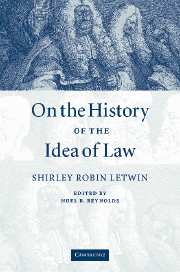Book contents
- Frontmatter
- Contents
- Editor's preface
- Introduction: The idea of law
- Part I Law anchored to a cosmic order
- Part II The Christian revision
- Part III The modern quest
- 6 Thomas Hobbes
- 7 John Locke
- 8 Immanuel Kant
- 9 Jeremy Bentham
- Part IV The significance of rules
- Part V The idea of law repudiated
- Part VI New foundations
- Index
6 - Thomas Hobbes
Published online by Cambridge University Press: 22 September 2009
- Frontmatter
- Contents
- Editor's preface
- Introduction: The idea of law
- Part I Law anchored to a cosmic order
- Part II The Christian revision
- Part III The modern quest
- 6 Thomas Hobbes
- 7 John Locke
- 8 Immanuel Kant
- 9 Jeremy Bentham
- Part IV The significance of rules
- Part V The idea of law repudiated
- Part VI New foundations
- Index
Summary
An escape from the tension between justice and liberty was provided by Thomas Hobbes's radical renunciation of the ancient idea of a cosmos where human reason has access to indisputable knowledge. In his attack on Aristotelianism, Hobbes ruthlessly spelled out the implications of living in a Christian universe. By pursuing St. Augustine's rejection of the pagan universe to its logical conclusion, Hobbes unequivocally replaced the concern with law as a link to divinity and an instrument of education with a picture of law as man's only resource against violence in a world that has no anchor to indisputable truth. By exploring the postulates and implications of this picture of law, Hobbes defined a new set of questions and opened the modern discussion of law.
His account of law rests on a division of the universe into two wholly separate domains: a world of concrete contingent being, which men inhabit, confronting another wholly alien world of infinite being, God the Creator. This picture of the universe – which explains the novelty in Hobbes's conception of law – is a radical departure from the ancient and medieval conception of human beings as products of matter informed by God's reason. Instead, Hobbes's human being is a creature made by God out of nothing, not according to any pattern, but as God in his infinite power willed. As this God is a Creator, and not an intelligible principle, the reason of man cannot in any way penetrate His ideas.
- Type
- Chapter
- Information
- On the History of the Idea of Law , pp. 91 - 107Publisher: Cambridge University PressPrint publication year: 2005



